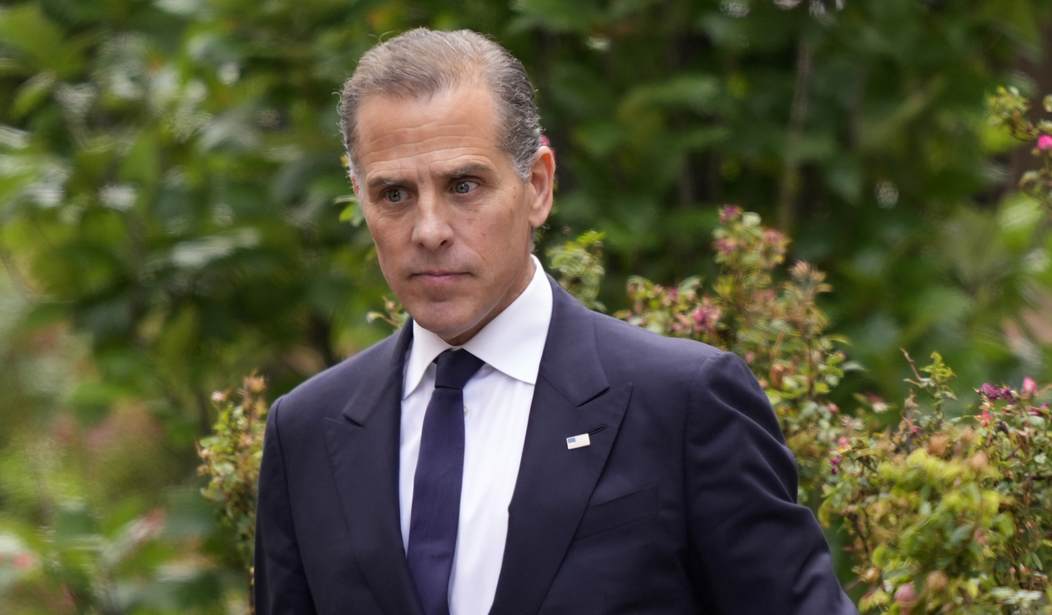Hunter Biden surprised prosecutors and legal watchers Thursday with his decision to plead guilty to nine criminal charges related to his failure to file and/or pay taxes between 2016 and 2019. Though Hunter initially intended to enter an Alford plea, in which he wouldn't admit guilt, he eventually entered a straight guilty plea without any type of deal from prosecutors as to sentencing.
While Alford pleas are rare, it's even rarer for a defendant to straight-up plead guilty to every single count they're charged with and without any concessions from prosecutors on punishment - especially when that defendant could face 17 years in prison and $1.35 million in fines.
READ MORE: Hunter Biden Enters Open Guilty Plea in Tax Case; Sentencing Set for December
So why would Hunter Biden do such a thing? Obviously, he has one huge advantage that other defendants don't have: his father is the sitting President of the United States and has the power to pardon him.
But Hunter could have availed himself of that option even if he'd gone to trial and been convicted, though that might not have gone over well in the court of public opinion after two-plus weeks of detailed, sordid testimony about Hunter's debauchery was presented.
Hunter was able to keep his full bacchanalia story out of his gun case in Delaware because those details weren't relevant to that charge. In this case, however, since Hunter claimed many of his lifestyle expenses as business expenses, allegedly in an attempt to hide income, and since he was charged with tax fraud, not only are the details of what those transactions were relevant, but they form the basis of proving the elements of the crimes with which Hunter was charged. His attorneys still filed motions to suppress that evidence in the tax case, but Scarsi's rulings last week didn't go their way. Lowell admitted in court those rulings were one reason Hunter felt entering the guilty plea was in his best interest.
READ MORE: New Details About What Hunter Biden Spent Money on Instead of Taxes Revealed at Pre-Trial Hearing
In his own words, though, here is what Hunter had to say about why he entered the guilty plea:
“I went to trial in Delaware not realizing the anguish it would cause my family, and I will not put them through it again. When it became clear to me that the same prosecutors were focused not on justice but on dehumanizing me for my actions during my addiction, there was only one path left for me. I will not subject my family to more pain, more invasions of privacy and needless embarrassment. For all I have put them through over the years, I can spare them this, and so I have decided to plead guilty.
"Like millions of Americans, I failed to file and pay my taxes on time. For that I am responsible. As I have stated, addiction is not an excuse, but it is an explanation for some of my failures at issue in this case. When I was addicted, I wasn't thinking about my taxes, I was thinking about surviving. But the jury would never have heard that or know that I had paid every penny of my back taxes including penalties.That I have been clean and sober for more than five years now because I have had the love and support of my family.
"I can never repay them for showing up for me and helping me through my worst moments. But I can protect them from being publicly humiliated for my failures. For anyone now going through the scourge of addiction, please know there is a light at the end of that seemingly endless tunnel. I was where you are now. Don't quit right before the miracle.”
Those are nice sentiments for his family, but where does this guy get off talking about prosecutors focused on dehumanizing him? Prosecutors are there to present evidence, not to humanize or dehumanize people. And if any criminal defendants are being dehumanized in this country right now, it's the J6 defendants and pro-life grannies being convicted for exercising their First Amendment rights. And while Hunter's whining about being dehumanized, any mention of the women he used for sex? The women he filmed himself having sex with - without their consent?
And of course the jury wouldn't hear that he paid back taxes, because *he* didn't pay them - Kevin Morris did. Trying to "fix" the crime afterward doesn't change the fact that it was committed in the first place. And, what relevance is it that Hunter is now clean and sober? Good for him, but really, it isn't relevant.
In the end, the only person Hunter has to blame is himself - not just for doing the crime in the first place, but for endlessly documenting it and then writing about it in a memoir.















Join the conversation as a VIP Member